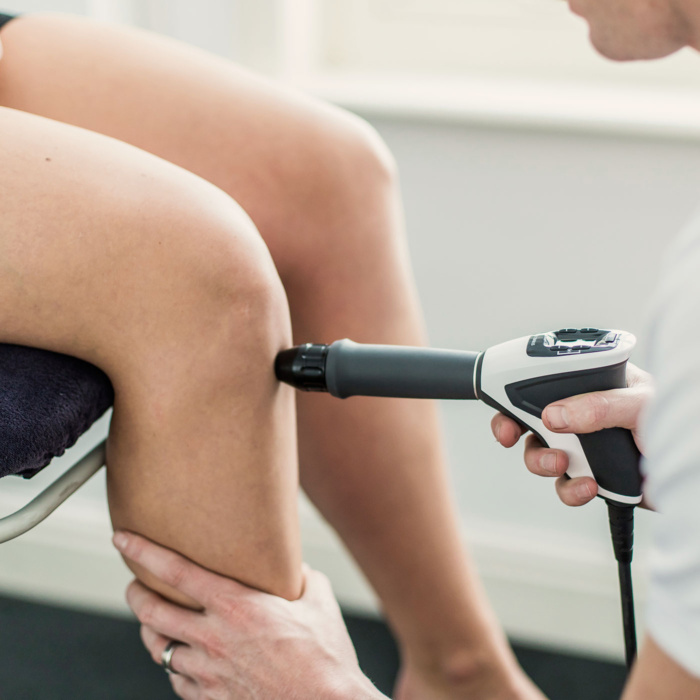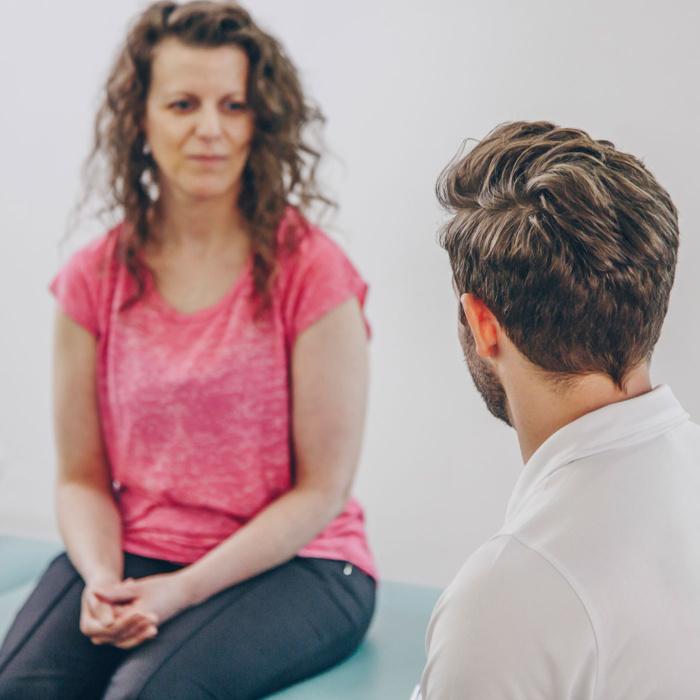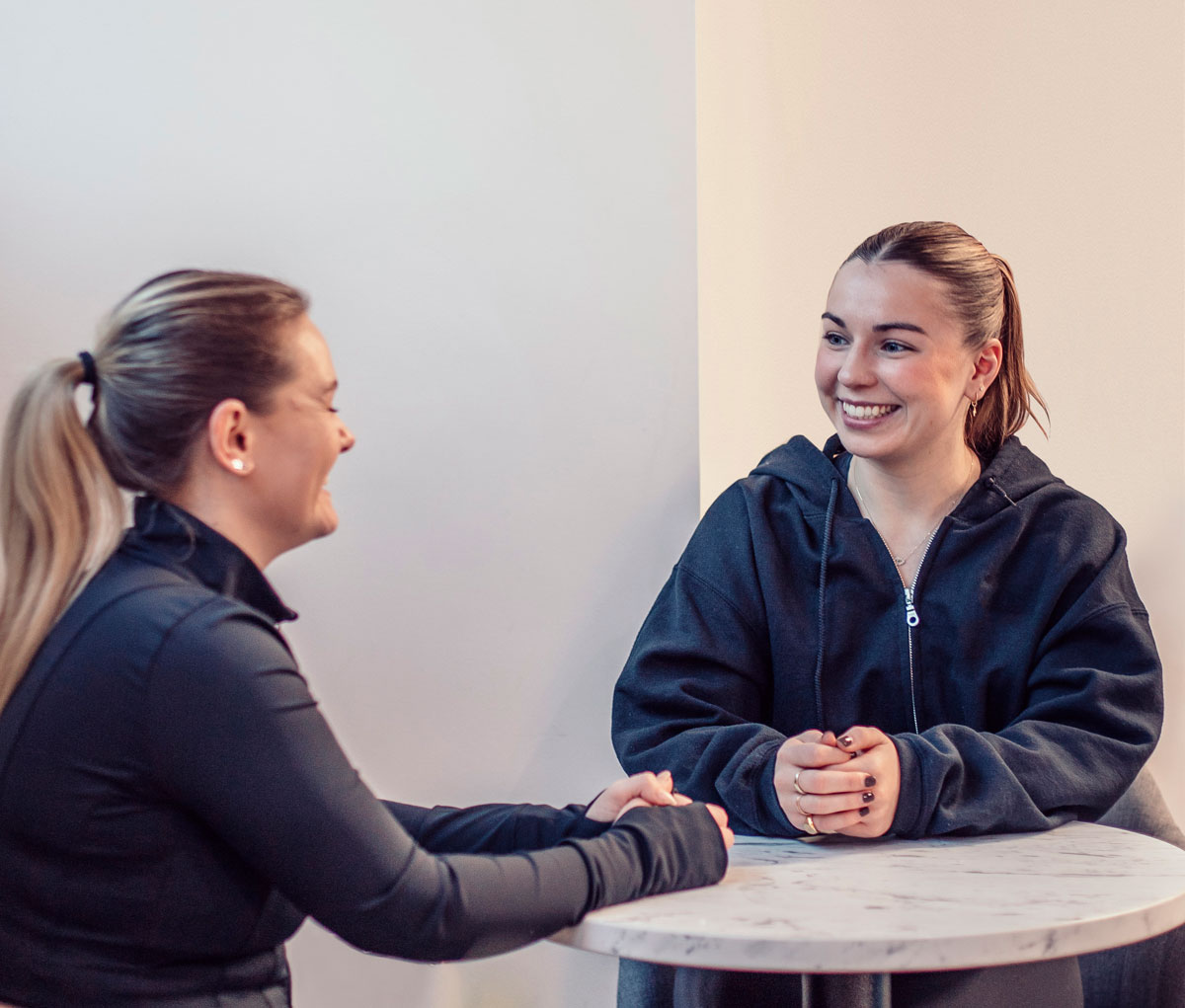Services
Experience Physiotherapy, the Ten way
We offer a range of physiotherapy services at Ten to help you return to natural, effective, functional movement and a healthy, happy, pain-free life.

About Physiotherapy at Ten
At Ten, there is no one-size-fits-all approach. We fully embrace the fact that everyone is different. That’s why we provide a truly bespoke service, creating realistic, individual plans for your recovery. Which means looking beyond your injury. We assess your diet, sleep, stress levels, and hydration, along with anything and everything else that could have a bearing on getting you well. We don’t just treat symptoms, we focus on underlying causes.
Our Physiotherapists have extensive knowledge of anatomy, physiology and biomechanics. They know the best medical experts to refer you to, and we regularly receive referrals from leading Consultants and Surgeons, helping their patients to better prepare for surgery and enabling them to make a quicker and more complete recovery.
In short, our service is different from most others. Unlike the conventional Physiotherapy model, our Therapists don’t work in isolation. Instead, they collaborate closely with Ten’s Rehab Specialists, Massage Therapists and Trainers. As a result, we're better equipped to relieve pain, stiffness and dysfunction, resolve the underlying cause, restore strength and mobility, and help you stay that way.
Our goal is for you to become stronger, happier and healthier. Ultimately, we’re all about restoring your freedom. So whether you’re looking for freedom of movement or freedom from pain, we’re here for you and we’d love to help.
Our Method
How We Treat You
RELIEVE
Our first priority is to provide relief. Wherever possible, we do our best to have an immediate impact on your pain, discomfort or mobility issues. We never forget that you’re the one with first-hand knowledge of your problem. By listening to what you have to say about it, and your understanding of its physical and emotional effects, we’re perfectly placed to help relieve your issue and provide advice and guidance on its home management.
- Listen-First Approach
- Bespoke Support
- Education
- Manual Therapy
- Dry Needing
- Home Healing Management
- Soft Tissue Treatment
- Acupuncture
- Mobilisation
REHABILITATE
Having attended to the more immediate problem of relief, our Physiotherapists move beyond the treatment of symptoms to find and address the root causes of your issue. With extensive knowledge of anatomy, physiology and biomechanical correction, enhanced by state-of-the-art equipment and techniques, our therapists can advise and guide you on your road to rehabilitation and recovery.
- Strengthening
- Biomechanical Correction
- Scar Massage
- Video-Based Exercise Programme
- Foundational Gait Analysis
- Objective Force Testing
- Data-Driven Care
- Progress Tracking
- Postural Correction
- Gym-Based Exercise
REINFORCE
Whether you’re recovering from injury or not, our aim is always to help you live healthier, happier and stronger throughout the whole of your life. That’s why our ‘whole-life’ support is about constant optimisation. Drawing on the expertise of Ten’s multidisciplinary team, we’ll give you an ongoing, long-term strategy for building strength and promoting restoration.
- Strength And Conditioning
- Evidence-Led Approach
- Progress Tracking
- Performance Gait Analysis
- Performance Enhancement
- Data-Driven Goals
- Preventative Programme Planning
- Peak-Performance Planning
- Reformer Pilates
- Circle Of Care

Our Approach
State of the art equipment
Our clinics are equipped with some of the latest assessment, diagnosis and treatment technologies, enabling our Physiotherapists to continually enhance treatment effectiveness and improve patient outcomes.
-
VALD FORCE PLACE TESTING
Force Plate testing brings new capabilities to rehab, prehab and performance-based programmes, allowing our Physios to accurately identify weakness and imbalances in stability, strength and movement. By providing precise, real-time data, they not only enable our Physios to assess and correct compensatory movement patterns, but also show clearly how - and how well - you’re improving.
-
SHOCKWAVE THERAPY
Shockwave Therapy is increasingly offered by top Physiotherapy clinics to reduce pain and discomfort, and improve both the speed and the extent of recovery. As part of an overall treatment plan, this clinically proven and non-invasive sound treatment is often used as an alternative to surgical intervention.
-
DIAGNOSTIC ULTRASOUND ASSESSMENT
Our point of care ultrasound service combines your physiotherapy examination with real-time, ultrasound imaging. This allows us to observe tissue behaviour during movement and better understand how your biomechanical structure responds to stress, allowing us to provide you with more precise and efficient care.
THINGS TO CONSIDER
HOW TO GET STARTED

-
1 START WITH AN INITIAL PHYSIOTHERAPY ASSESSMENT
Regardless of what you may or may not know about your condition already, we always recommend starting with an Initial Consultation. This helps us to ensure we have enough time to clearly understand your starting point and your unique circumstances, and it allows us to begin treating you from your first session.
-
2 IF YOU HAVE PRIVATE MEDICAL INSURANCE
Always contact your provider in advance to get pre-authorisation for your condition. We work with the majority of private medical insurers and we can bill them directly, but you’ll need an authorisation code to secure your bookings.
This code also tells your Physiotherapist how many sessions you’ll be covered for, so that they can provide a clearer expectation of what your treatment plan will look like.
-
3 ARRIVE PREPARED
Initial assessments with our Physiotherapists are your opportunity to share the history of your injury and any concerns or challenges you have, so the Physio can understand the nature and severity of your condition or injury. If you have any relevant notes, scans or referrals letters, your Physiotherapist will find these helpful.
Bring something suitable to wear, such as shorts or activewear. Your Physio will need to assess the area, so the appropriate clothing will better allow them to do that.
Insurance Information
Ten is recognised by most major private health insurance companies for Physiotherapy treatment.













FAQ
GOT QUESTIONS?
WE’VE GOT ANSWERS!

Still have questions? Read our full FAQs or contact our team, and we'll be happy to assist
-
How do I know if I need physiotherapy?
Sometimes it’s obvious. Most commonly because you’ve been referred by a GP, surgeon or medical specialist, or even a Personal Trainer. Or perhaps because you’ve had an injury that isn’t healing, is causing you pain, or restricting your mobility.
But these aren’t the only reasons where Physiotherapy can be helpful. It can help with a range of posture-related issues like back and neck pain. It can identify areas of weakness or reduced movement that could lead to injury in the future.
It is highly effective as part of an overall physical maintenance approach (prehabilitation) designed to keep you injury-free and help maintain strength, wellbeing mobility and activity levels over time.
Regular preventative Physiotherapy is also a key element of an overall performance and training plan for many athletes and sports people, professionals and keen amateurs alike.
If you’re not sure whether you need Physio, simply call one of our studios and ask to speak to one of our Physios. It’s free and there’s no obligation.
-
What conditions or injuries can physio help with?
Physio can help with pretty much everything and anything that can impact on your body’s quality of movement and function, whether that’s to do with injury treatment and rehabilitation, muscle tightness, joint mobility, postural alignment (static and in motion) or performance enhancement. It’s effective with a range of issues and conditions, generally musculoskeletal in nature (i.e affecting the muscles, joints and connecting tissues). It’s most commonly used to treat injuries and pain, whether from sports, accidents or other physical trauma. It’s also often an essential element in preparing for or recovering from surgery.
-
What happens in a physiotherapy initial assessment?
The format of these sessions includes: an initial discussion, physical assessment, goal setting and onward advice provision.
During the initial discussion, your physiotherapist will ask questions to help them understand your lifestyle and events which may contribute to how your body currently feels and functions. This will inform the content of your physical assessment and may include assessing factors like joint mobility, stability, muscle strength, and power, as well as a hands-on assessment such as manipulation or palpation of the area(s) identified.
From their assessment and diagnosis of your injury or condition and any underlying cause, our physiotherapists will work with you to understand your goals and create a treatment plan which may involve a combination of strategies such as: an individualised exercise plan, manual therapy sessions, modification of hobbies and self-management strategies.
-
What should I wear to a physiotherapy appointment?
Please wear comfortable clothing that you can move freely in – changing rooms are available at all our sites should you wish to use them.
In order to visibly and/or physically assess and treat the area(s) in question, you may need to remove your shirt or trousers. Your physiotherapist will request your consent before this happens.
-
How many physio sessions will I need to see results?
There’s no easy answer to this question as it depends on so many factors, including the severity and nature of your injury or condition, your age, overall health and fitness levels and injury history. (Not to mention how diligently you do any home exercises you’re given!)
However as a general indication, for the majority of clients who we treat, somewhere between 6 and 12 sessions is usually sufficient.
-
Can I book physio with my health insurance?
Yes. Our physiotherapists are registered with most major Health Insurance Providers (including Bupa and Axa PPP).
In order to book with us, you’ll need to contact your insurer to get a pre-authorisation code. You’ll then need this code, along with your provider number, to complete your booking.

